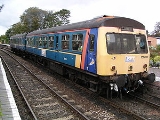
British Rail Class 101
Overview
British Rail
British Railways , which from 1965 traded as British Rail, was the operator of most of the rail transport in Great Britain between 1948 and 1997. It was formed from the nationalisation of the "Big Four" British railway companies and lasted until the gradual privatisation of British Rail, in stages...
Class 101 diesel multiple unit
Diesel multiple unit
A diesel multiple unit or DMU is a multiple unit train consisting of multiple carriages powered by one or more on-board diesel engines. They may also be referred to as a railcar or railmotor, depending on country.-Design:...
s were built by Metro-Cammell at Washwood Heath
Washwood Heath
Washwood Heath is a ward in Birmingham, within the formal district of Hodge Hill, roughly two miles north-east of Birmingham city centre, England...
in Birmingham
Birmingham
Birmingham is a city and metropolitan borough in the West Midlands of England. It is the most populous British city outside the capital London, with a population of 1,036,900 , and lies at the heart of the West Midlands conurbation, the second most populous urban area in the United Kingdom with a...
from 1956 to 1959, following construction of a series of prototype units
British Rail Metro-Cammell
In 1955, Metropolitan Cammell produced its first lightweight Diesel multiple units, the prototypes of what were to become British Rail's most successful and longest-lived First Generation DMU type, the Class 101.- Operations :...
. This class proved to be the most successful and longest-lived of all BR's First Generation DMUs, with the final five units being withdrawn on 24 December 2003. The oldest set was, by then, just over 47 years old.
When TOPS
TOPS
Total Operations Processing System, or TOPS, is a computer system for managing the locomotives and rolling stock owned by a rail system...
was originally introduced only the Driving Motor Brake Second (DMBS) and the Driving Motor Composite (with Lavatory) (DMCL) were classified as Class 101 (AEC engines) or Class 102 (Leyland engines).
Unanswered Questions

